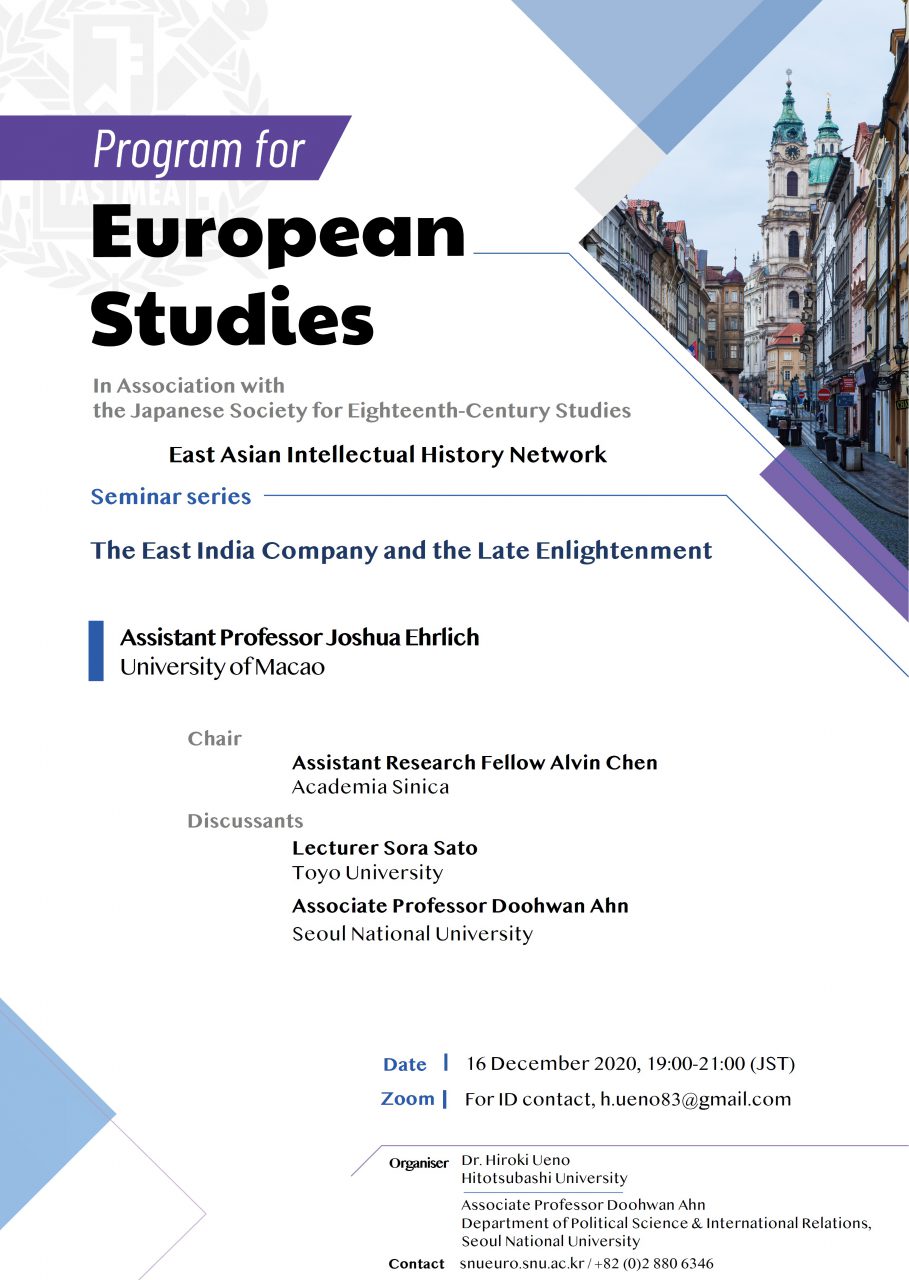東アジア思想史ネットワーク (East Asian Intellectual History Network)
共催:ソウル国立大学・ヨーロッパ研究プログラム
後援:日本18世紀学会
3rd EAIHN Online Seminar
December 16th (Wed.), 2020. 7pm-9pm
Speaker: Joshua Ehrlich (University of Macau)
Paper title: The East India Company and the Late Enlightenment
Discussants: Sora SATO (Toyo University, Tokyo) and Doohwan AHN (Seoul National University)
Chair: Alvin CHEN (Academia Sinica, Taipei)
On 16th December 2020, the East Asian Intellectual History Network (EAIHN), through the auspices of Seoul National University’s Program for European Studies, hosted a talk by Joshua Ehrlich (University of Macau) entitled “The East India Company and the Late Enlightenment.” After opening remarks by the chair, Alvin Chen (Academica Sinica), Ehrlich introduced his paper, discussed its main points, and situated it in the larger context of his current book project. He focused on one particular ideological point of connection between the Company and (the) Enlightenment: the Company’s idea of “conciliating” political classes in Britain and India via scholarly patronage. He then traced how this idea was developed, criticized, and reformulated by Company figures and their interlocutors in the late eighteenth century. In their responses, Sora Sato (Tokyo University) and Doohwan Ahn (Seoul National University) raised a number of incisive points for further consideration, touching on Edmund Burke, Istvan Hont’s “jealousy of trade,” and much else besides. Finally, the audience engaged Ehrlich in a stimulating discussion of further topics, including the drawing of comparisons between the British and other European “East India” companies.
Reported by Joshua Ehrlich (University of Macau)
東アジア思想史ネットワーク (EAIHN) 第3回オンラインセミナーが、ソウル国立大学・ヨーロッパ研究プログラムの財政支援を得て、2020年12月16日に開催された。なお、日本18世紀学会より後援を受けた。マカオ大学の Joshua Ehrlich氏が “The East India Company and the Late Enlightenment” という演題で報告を行い、その後討論者である東洋大学の佐藤空氏、ソウル国立大学のAhn Doohwan氏によるコメントと質問、さらに報告者による応答が続いた。参加者との討論の時間も50分ほど確保することができた。報告内容に加え、講演者が準備中の単著や研究計画をめぐっても以下のような活発な議論が展開された。後期啓蒙思想におけるアジアおよびインド理解の内実、特に大英帝国を中心としたヨーロッパ諸国の両インド会社による植民や帝国主義的統治が拡大するなかで、大航海時代以降のオリエンタリズムやアジア表象にどのような変化がもたらされたのか、ヘースティングズに代表される東インド会社幹部が(宣教活動ではなく)学術的な実地調査を行なう学者を支援することで本国政府や世論に対して自らの活動をどのように正当化しようとしたのか、また従属領 (dependencies) の宗教・文化に対する実証的研究の深まりがヒュームのいう「文明的君主政」概念のアジアへの適用可能性を拡大した点とそのコロニアルな限界――こうした論点について、知(識)が流通し解釈され変容していく動的な過程に注目する history of knowledge の観点から議論された。さらに啓蒙期の「商業」観をめぐっては、文明化作用をもたらす「穏和さ」のイメージで商業をとらえるモンテスキュー的な理解に対して、むしろ警戒心ないし嫉妬を激化させかねない国際貿易の作用を強調するヒューム的な見方 (jealousy of trade) の重要性がDoohwan氏によって指摘された。とりわけアダム・スミスに代表される一部啓蒙思想家の重商主義ないし商業システムへの批判的言説を勘案するならば、貿易独占権を付与された勅許会社をめぐる本国および植民地での知的かつ実践的な論争においては、commerce の語自体が帯びる両義的なニュアンスにも着目しつつ、テクストとコンテクストに内在した研究をさらに進めていく必要が確認された。
(Hiroki UENO 上野大樹)









